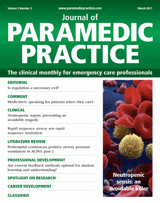References
Paramedic perceptions and attitudes to working with patients with alcohol-related injury or illness
Abstract
Aims
To ascertain views, perceptions and attitudes of paramedics when working with patients presenting with alcohol-related injury or illness, and to explore perceived barriers and facilitators for the introduction of alcohol interventions to the NHS ambulance services.
Methods
A total of 142 (24%) from 589 paramedics from the North East Ambulance Service NHS Foundation Trust returned completed surveys between January 2013 to April 2013, which included measures of current perceptions and attitudes of working with patients with alcohol-related injury or illness, and the Shortened Alcohol and Alcohol Problems Perception Questionnaire (SAAPPQ).
Results
Paramedics reported little to no formal training on working with patients with alcohol-related injury or illness (77%). Paramedics scored low across all domains of the SAAPPQ for working with both problem and dependent drinkers. Not having suitable counseling materials (77%), not enough training (72%) and no facilities or time to deal with prevention (69%) were key barriers.
Conclusions
At this present time, levels of commitment, motivation, satisfaction, legitimacy and adequacy are low in front-line paramedics when working with patients with alcohol-related injury and illness. However, they are open to finding ways to provide interventions if they are adequately trained and have appropriate referral pathways open to them.
Excessive drinking is a global problem, with approximately 2.5 million deaths (4%) worldwide attributable to alcohol (World Health Organization, 2010). In the UK, alcohol-related harm is estimated to cost society £21 billion annually (HM Government, 2012). Health care costs associated with caring for those with alcohol-related problems alone are estimated to be £2.7 billion (Martin et al, 2012). The percentage of patients admitted to hospital for alcohol-related disease, injury or condition, as a primary or secondary reason has increased by 51% from 807 700 to 1 583 725 from 2002/03 to 2011/12 (Lifestyle Statistics and Health and Social Care Information Centre, 2013). The UK falls slightly below the European average with 10.2 litres of alcohol consumed per adult per year (Organisation for Economic Co-operation and Development, 2012). Historically, the UK has been ranked low in death rates from cirrhosis; however, there is now some convergence whereby EU member states with previously high death rates are reducing their drinking habits and therefore their death rates, while the UK gradually increase theirs. (Rehm, 2012)
Subscribe to get full access to the Journal of Paramedic Practice
Thank you for visiting the Journal of Paramedic Practice and reading our archive of expert clinical content. If you would like to read more from the only journal dedicated to those working in emergency care, you can start your subscription today for just £48.
What's included
-
CPD Focus
-
Develop your career
-
Stay informed

